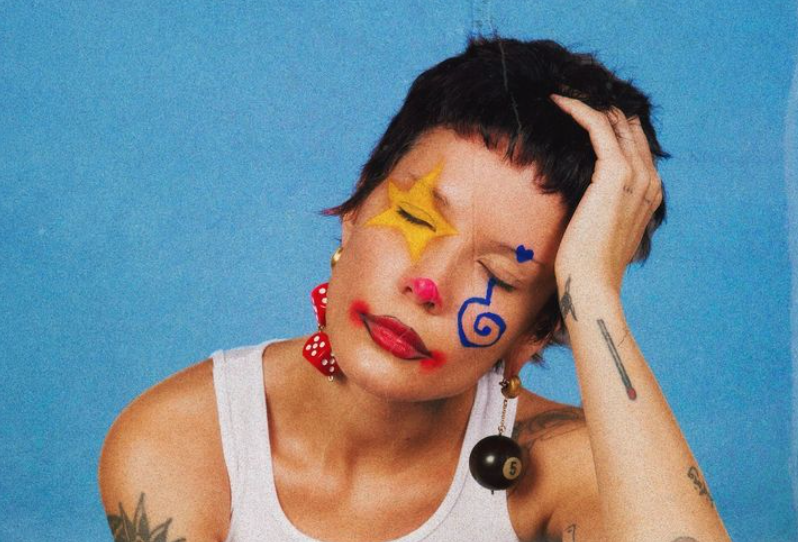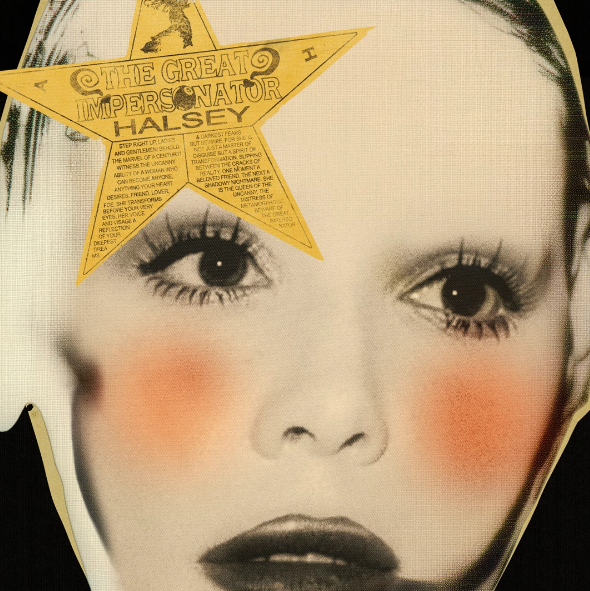On her fifth studio album, a down-and-out Halsey is forced to confront her own mortality. The product? A heavy, hour-long tour de force.
In 2021, the New Jersey-born star delivered her career’s standout work to date in If I Can’t Have Love, I Want Power. A startling record produced by Trent Reznor and Atticus Ross, that project landed with a 53-minute horror film that saw the songwriter straddle music and cinema with genre-bending prowess.
On The Great Impersonator, Halsey sheds that maximalist production but the album somehow carries a horror even greater than its predecessor. Tracking her health battle with lupus and a lymphoproliferative disorder, the songwriter wields her pen with an alarming honesty that makes the record one of the 21st century’s most uncomfortable listens.
Halsey has become one of the leading lights in the world of concept albums since arriving in full among the mysterious Badlands of 2015 and the tale of The Great Impersonator is once again told through a lens. This time around, the star impersonates 18 musical inspirations from Bruce Springsteen to Dolly Parton and Evanescence to Bjork, imagining her career playing out across the decades.
As far as the artist’s concepts go, there’s no denying that The Great Impersonator is the most fully fleshed out of them all. Even before the record dropped, the star had shared anecdotes on the artist who had inspired each song and donned their iconic outfits in a long series of social media posts. The process was mocked by some corners of the internet, but its thoroughness was undoubtedly impressive – this is an artist committed to her vision.
While Halsey leaves no stone unturned with her most fleshed-out concept to date, it is also perhaps her least convincing attempt at disguising her intimate tales. The pain with which the star confronts the sickening reality of her past two years remains too crushing to be wrapped in a bow of musical icons.
There are two thoughts at the heart of the album’s dense 66 minutes. The first is a realisation that she cannot keep on keeping on. The second is a question over the legacy she will leave behind.
One of the singer’s most startling shows of her career came at Leeds Festival in 2022. Headlining the prestigious UK festival, the star left the stage several times to throw up but returned to finish her set. At the time, a statement claimed that it was down to food poisoning but at her intimate Koko show this summer, Halsey admitted those were the first symptoms of her serious health battle.
It’s impossible not to think of that night as the star confesses on Britney Spears-inspired ‘Lucky’ that, “I told everybody I was fine for a whole damn year, and that’s the biggest lie of my career.”
Between releasing that single in July and ‘The End’ in June, Halsey burst the bubble around her star persona. The amped-up and power-hungry voice behind If I Can’t Have Love, I Want Power was, in fact, fighting to survive when the curtain came down.
Finding the courage to tell the world was clearly a mission. On ‘Ego’, which packs an undeniable The Cranberries-influenced punch, the star takes a hammer to the persona of Halsey. “I think I should try and kill my ego,” she admits before adding, “I’m doing way worse than I’m admitting.”
The singer’s health battle is present in every moment of The Great Impersonator, ‘Dog Years’ and ‘I Never Loved You’ particularly visceral in the images of blood transfusions and holes in hearts.
Written when in the trenches with her health, there’s little time for retrospection on The Great Impersonator, but Halsey does allow herself to look back on those months in the spotlight before diagnosis – perhaps most pertinently on the album track.
‘The Great Impersonator’ serves as the record’s epilogue. Halsey may have developed a penchant for impersonations but there’s a winking acceptance that her greatest act came when trying to hide her health battle from prying eyes. “I’m in a pick-up truck, the door is stuck, I’m sinking in the water, the girl inside is waving but the people just applaud her, this is a cry for help,” she muses.
The recurring thought of legacy is unsurprisingly present on that album closer too, as Halsey asks whether “the story dies with its narrator”. That train of thought climaxes halfway through the record on ‘Lonely is the Muse’.
A song that could be regarded as the artist’s magnum opus, it’s an extraordinary piece of music. The public discussion over what celebrities do or don’t owe fans is a hot topic in today’s pop culture – but there’s no doubting that over the past decade Halsey has given her fans everything.
The 30-year-old has been candid about sexual abuse, miscarriage, her struggles to conceive a child, an advocate for LGBTQ+ rights and much more. A role model for so many, it makes the menacing way she toys with martyrdom over crashing production on ‘Lonely is the Muse’ all too searing a listen.

During The Great Impersonator, Halsey asks listeners time and time again what her legacy may be – it takes less than a minute on opener ‘Only Living Girl in LA’ for her to wonder how big a crowd her funeral would pull.
It’s understandable why the artist may overanalyse her public reputation too. There’s no doubting her credentials as a leading modern pop artist but the work the world knows her best for – namely the likes of ‘Closer’, ‘Eastside’ and Without Me’ – are far from her best releases.
Halsey’s most pioneering music comes in If I Can’t Have Love I Want Power, the bedroom pop of Room 93 and grit of BADLANDS, which remain more cult classics than mainstream hits. Those projects deserve more acclaim and should be regarded as the singer’s legacy, but will that be the case?
What is certain, is that Halsey deserves more than the hand she has been dealt. There’s a sense that she knows that too. On ‘Darwinism’ the singer looks into the world as a monstrous outsider, harbouring a desperation to fit in – “You all grew body parts I fear I’ll never grow,” she coos. Meanwhile, on the agonising ‘Life of the Spider (Draft)’ she pours fragile scorn over a world that has misunderstood her.
It’s rare that Halsey allows relief to spill into The Great Impersonator but the moments of hope come as an emotional suckerpunch, and centre on the future she sees for son Ender.
It’s the three-year-old’s adorable babbling that opens the final ‘Letter to God (1998)’, but the innocence of youth is made tough to revel in as the singer watches him play with toys on the kitchen floor. “I don’t ever want to leave him, but I don’t think it’s my choice,” she accepts before begging a divine power for more time.
It’s no surprise that The Great Impersonator is at its most tear-jerking with Ender as the subject again. On ‘I Believe in Magic’, Halsey passes on a message from beyond the grave with beautifully crushing hope in the face of adversity.
“I believe in magic […] I still believe in heaven even if they never let me in, I started to believe in love the day I met my little twin,” the singer somehow musters – writing something like that to your child at just 30 years old is a terrifying reality to face, let alone release into the world.
But, at the end of it all, that is the Halsey legacy. There is magic in this pop music and, no matter her personal tribulations, there always has been. The Great Impersonator cements the singer’s position as a generation-leading artist, it doesn’t matter how many people realise it.
Rating – 5/5
Are you a Halsey fan? Let us know @CelebMix on Twitter.

